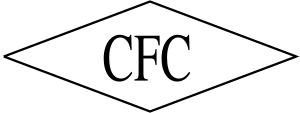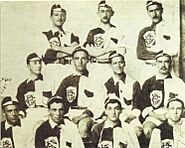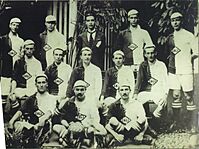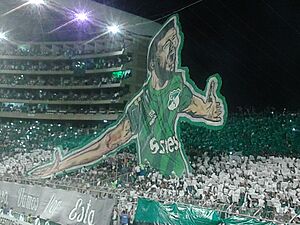Deportivo Cali facts for kids
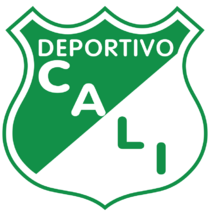 |
||||
| Full name | Asociación Deportivo Cali | |||
|---|---|---|---|---|
| Nickname(s) | Los Verdiblancos (The Green-Whites) Los Azucareros (The Sugarmakers) La Amenaza Verde (The Green Menace) El Glorioso (The Glorious) |
|||
| Founded | 23 November 1912 as The Cali Football Club | |||
| Ground | Estadio Deportivo Cali Palmira, Colombia |
|||
| Capacity | 42,000 | |||
| Owner | 2,000 members | |||
| Chairman | Humberto Arias Bejarano | |||
| Manager | Alberto Gamero | |||
| League | Categoría Primera A | |||
| 2024 | Primera A, 15th of 20 | |||
|
||||
Deportivo Cali is a famous sports club from Cali, Colombia. It is best known for its football team. The team plays in the top Colombian league, called Categoría Primera A.
Deportivo Cali is one of the most successful football teams in Colombia. They have won ten national league championships. They also won one Copa Colombia and one Superliga Colombiana. This makes a total of twelve major titles. Their home stadium, Estadio Deportivo Cali, is the largest football stadium in Colombia. It can hold 42,000 fans.
Deportivo Cali is special because it is the only Colombian football club that owns its own stadium. It is also the only club in Colombia owned by its fans. In 1978, it was the first Colombian team to reach the final of the Copa Libertadores, a big South American tournament. In 2016, Forbes magazine said Deportivo Cali was the 36th most valuable football team in the Americas.
Club History: From Students to Champions
How Deportivo Cali Started
The club began in 1908 as Cali Football Club. It was started by students who learned about football in Europe. In 1912, these students, led by the Lalinde brothers, officially organized the team. They renamed it Deportivo Cali. Their first coach was Francisco Villa Bisa from Spain.
Their first game was between two of their own teams, CFC "A" and CFC "B". About 300 people watched this match. By 1928, the club was called "Deportivo Cali A". It represented the Valle del Cauca Department in national games. They won titles between 1928 and 1930.
In 1945, other sports clubs joined Deportivo Cali. This added new sports like athletics, basketball, and swimming. By 1948, the team was ready to play in the new professional national league.
Joining the Professional League
Deportivo Cali's first professional game was a 2-0 loss to Atlético Junior. Their first home game was a 2-2 draw. Their first win came in the fourth match, a 4-1 victory against Atlético Nacional. They finished their first season in eighth place.
In 1949, a businessman named Carlos Sarmiento Lora became the club chairman. He brought many talented players from Peru, like Máximo Mosquera and Valeriano López. These players, along with others, formed a strong attacking group known as the Rodillo Negro (Black Roller). Deportivo Cali went 18 matches without losing that year. They ended up tied with Millonarios for the league title. They lost the final series and finished as runners-up for the first time.
A Short Break from Football
In 1955, Deportivo Cali finished last in the league. They also had many debts. Because of this, the club decided to stop playing in the league in 1956. This caused problems, and the club's official status was taken away.
Colombian football was going through a tough time. Other clubs also faced difficulties. In 1959, a group led by Alex Gorayeb worked to bring Deportivo Cali back. They got permission to use the league spot of another club, Boca Juniors de Cali. This allowed Deportivo Cali to return to the league. They played their first game back on March 10, 1959, winning 3-1 against Atlético Bucaramanga.
The Golden Years: Winning Titles
In 1962, Deportivo Cali became an official legal organization. That year, they scored over 100 goals in the league. They finished as runners-up again to Millonarios. They also had their biggest win ever, beating Deportivo Pereira 9-0.
Deportivo Cali won their first league title in 1965. Francisco "Pancho" Villegas was their coach. The team had a slow start but made a great comeback. They won the title with one game left. They beat Cúcuta Deportivo 3-1 away from home.
Between 1965 and 1974, Deportivo Cali had its "golden era." They won five of their ten Colombian championships during this time. These wins were in 1965, 1967, 1969, 1970, and 1974. They became one of the top teams in Colombia. Many great players played for the team during these years. One of the most famous was Jairo "El Maestro" Arboleda. He was known for his amazing skills in midfield.
After 1974, Deportivo Cali did not win a league title for 22 years. However, they remained strong. They finished as runners-up in 1976, 1977, and 1978.
Reaching the Copa Libertadores Final
In 1978, Deportivo Cali made history. They became the first Colombian club to reach the final of the Copa Libertadores. This is South America's biggest club competition. They played against strong teams from Uruguay and Paraguay. In the final, they faced the defending champions, Boca Juniors from Argentina. Deportivo Cali drew the first game at home but lost the second game 4-0 in Argentina. They finished as runners-up.
The 1980s: Rivalries and Near Misses
The 1980s were a tough time for Deportivo Cali. They finished as runners-up in 1980. They also had a famous win against River Plate in the 1981 Copa Libertadores. However, other teams like América de Cali and Atlético Nacional became very strong.
Deportivo Cali and their city rivals, América de Cali, played for the league title in 1985 and 1986. Deportivo Cali finished second in both seasons. Key players during this time were Carlos Valderrama and Bernardo Redín. They were great players but could not win a title with the club. For the next 10 years, Deportivo Cali did not challenge for the title much.
Return to Glory in the Late 1990s
In 1996, Deportivo Cali finally ended their 22-year league title drought. Coach Fernando "El Pecoso" Castro led the team. Players like goalkeeper Miguel Calero and striker Víctor Bonilla were key. They won the title by drawing with América de Cali on the last day.
Two years later, in 1998, Deportivo Cali won their seventh league title. They beat Once Caldas 4-0 in the first game of the final and drew 0-0 in the second. That same year, they reached the final of the Copa Merconorte but lost to Atlético Nacional.
Deportivo Cali played in the 1999 Copa Libertadores as Colombian champions. They reached the final for the second time in their history. They beat teams from Chile, Uruguay, and Paraguay. In the final, they lost to the Brazilian team Palmeiras in a penalty shootout.
The 21st Century: Ups and Downs
The early 2000s were a mix of good and bad for the club. In 2002, a sad event happened. Two players, Hernán Gaviria and Giovanni Córdoba, were struck by lightning during practice. Gaviria died instantly, and Córdoba passed away three days later. The team was leading the league at the time but struggled to recover.
Deportivo Cali won their eighth league title in 2005. They beat Real Cartagena in the finals. Hugo Rodallega was one of the top scorers. However, they also lost finals to less favored teams in 2003 and 2006.
In international games, they reached the round of 16 in the 2003 Copa Libertadores and the quarter-finals in 2004. But in 2006, they had a very poor performance in the Copa Libertadores.
In 2010, Deportivo Cali won the Copa Colombia for the first time. They beat Itagüí Ditaires in the final. Their new stadium, Estadio Deportivo Cali, hosted its first official match that year.
In 2013, they reached the final of the league tournament but lost to Atlético Nacional. However, they got revenge by winning the 2014 Superliga Colombiana against the same team. After this, the club started focusing on using young players from its own youth academy.
Recent Success: Young Talent and More Titles
In 2015, with coach Fernando "Pecoso" Castro, Deportivo Cali won the Torneo Apertura. The team was mostly made up of young players from their academy. This team became known as El kínder del Pecoso (Pecoso's kindergarten). Young players like Harold Preciado and Rafael Santos Borré were top scorers.
In 2021, Deportivo Cali won their tenth league title after six years. Former player Rafael Dudamel became the coach. The team had a great winning streak and reached the semi-finals. They beat Junior to qualify for the final. In the final, they faced Deportes Tolima. They drew the first game 1-1 at home. In the second game, they came from behind to win 2-1 and claim the title. Harold Preciado, who also played in the 2015 winning team, was the top scorer with 13 goals.
Club Badges Through Time
Crest Evolution
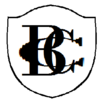 |
 |
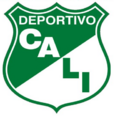 |
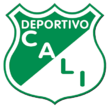 |
|
| 1912–16 | 1916–26 | 1926–48 | 1948–2012 | 2012–present |
Team Rivalries
The Valle del Cauca Derby
Deportivo Cali's biggest rival is América de Cali. Their matches are called the "Clásico Vallecaucano" (Valle del Cauca Derby). They are also known as the "Clásico de San Fernando." The first derby was played in 1931, with Deportivo Cali winning 1-0. The first professional derby was in 1948.
On October 10, 2010, Deportivo Cali and América de Cali played their first derby at Deportivo Cali's new stadium. Deportivo Cali won that game 6-3. The derby was not played in the top league between 2012 and 2016 because América de Cali was in a lower division. However, they still played each other in the Copa Colombia.
- Total matches played: 317
- Deportivo Cali Wins: 119
- América de Cali Wins: 97
- Draws: 101
The Vintage Classic
Deportivo Cali also has a rivalry with Millonarios. This match is called the Clásico añejo (Vintage Classic). It was one of the first big rivalries in Colombian football. These two teams played for the 1949 league title, which Millonarios won. The rivalry grew stronger in the 1960s and 1970s. Even though other rivalries have become more popular, this match is still important.
Deportivo Cali Supporters
Deportivo Cali has one of the largest fanbases in Colombia. Their main fan group is called Frente Radical Verdiblanco. This group was started in 1992. They are known for their strong support for the club. They stand in the southern part of Estadio Deportivo Cali.
Other fan groups include Avalancha Verde Norte and Horda Combativa. These groups stand in the northern part of the stadium. In recent years, Deportivo Cali has had many fans attend their home matches. They average nearly 15,000 fans per game.
Deportivo Cali's Home Stadium
Until 2014, Deportivo Cali played their home games at Estadio Olímpico Pascual Guerrero in Cali. They shared this stadium with América de Cali. In 2008, Estadio Deportivo Cali (also known as Estadio de Palmaseca) opened. It is located outside of Cali, in Palmira. Deportivo Cali moved into their own stadium permanently in 2015. This makes them the only club in Colombia to own its stadium. When it opened, the stadium could hold 52,000 people, but after some changes, its capacity is now 42,000.
Club Achievements
| Type | Competition | Titles | Seasons |
|---|---|---|---|
| Domestic | Categoría Primera A | 10 | 1965, 1967, 1969, 1970, 1974, 1995–96, 1998, 2005–II, 2015–I, 2021–II |
| Copa Colombia | 1 | 2010 | |
| Superliga Colombiana | 1 | 2014 | |
| Regional | Campeonato Departamental | 1 | 1935 |
- record
- s shared record
Second Place Finishes
- Categoría Primera A
- Runners-up (14): 1949, 1962, 1968, 1972, 1976, 1977, 1978, 1980, 1985, 1986, 2003–II, 2006–I, 2013–II, 2017–I
- Copa Colombia
- Runners-up (2): 1981, 2019
- Superliga Colombiana
- Runners-up (2): 2016, 2022
- Copa Libertadores
- Runners-up (2): 1978, 1999
- Copa Merconorte
- Runners-up (1): 1998
Players of Deportivo Cali
Current Team Squad
|
|
Players on Loan to Other Teams
|
|
Deportivo Cali Players in the World Cup
The following players were part of their country's team at the FIFA World Cup while playing for Deportivo Cali:
 Germán Aceros (1962)
Germán Aceros (1962) Buenaventura Ferreira (1986)
Buenaventura Ferreira (1986) Jorge Amado Nunes (1986)
Jorge Amado Nunes (1986) Bernardo Redín (1990)
Bernardo Redín (1990) John Wilmar Pérez (1998)
John Wilmar Pérez (1998) Juan Guillermo Castillo (2010)
Juan Guillermo Castillo (2010) Faryd Mondragón (2014)
Faryd Mondragón (2014) Abel Aguilar (2018)
Abel Aguilar (2018) Camilo Vargas (2018)
Camilo Vargas (2018)
Famous Players of Deportivo Cali
 Ernesto Álvarez
Ernesto Álvarez Alberto de Jesús Benítez
Alberto de Jesús Benítez Abel Da Graca
Abel Da Graca Rubén Darío Insúa
Rubén Darío Insúa Martín Morel
Martín Morel Cristian Nasuti
Cristian Nasuti Rubén Ponce de León
Rubén Ponce de León José Sand
José Sand Néstor Scotta
Néstor Scotta José Rosendo Toledo
José Rosendo Toledo Jorge Aravena
Jorge Aravena Jaime Riveros
Jaime Riveros Abel Aguilar
Abel Aguilar Adolfo Andrade
Adolfo Andrade Jairo Arboleda
Jairo Arboleda Arley Betancourt
Arley Betancourt Víctor Bonilla
Víctor Bonilla Rafael Santos Borré
Rafael Santos Borré Henry Caicedo
Henry Caicedo Miguel Calero
Miguel Calero Oswaldo Calero
Oswaldo Calero Mayer Candelo
Mayer Candelo Fernando Castro
Fernando Castro Óscar Córdoba
Óscar Córdoba Álvaro Domínguez
Álvaro Domínguez Walter Escobar
Walter Escobar Andrés Estrada
Andrés Estrada Carlos Estrada
Carlos Estrada Frank Fabra
Frank Fabra Hermán Gaviria
Hermán Gaviria Teófilo Gutiérrez
Teófilo Gutiérrez Giovanni Hernández
Giovanni Hernández Carlos Mario Hoyos
Carlos Mario Hoyos Jhon Kennedy Hurtado
Jhon Kennedy Hurtado Edison Mafla
Edison Mafla Faryd Mondragón
Faryd Mondragón Fredy Montero
Fredy Montero Tressor Moreno
Tressor Moreno Luis Muriel
Luis Muriel Elkin Murillo
Elkin Murillo Jeison Murillo
Jeison Murillo Jámison Olave
Jámison Olave Willington Ortiz
Willington Ortiz Armando Osma
Armando Osma Ever Palacios
Ever Palacios Helibelton Palacios
Helibelton Palacios Oscar Pareja
Oscar Pareja Andrés Pérez
Andrés Pérez John Wilmar Pérez
John Wilmar Pérez Harold Preciado
Harold Preciado Jorge Ramírez Gallego
Jorge Ramírez Gallego Bernardo Redín
Bernardo Redín Hamilton Ricard
Hamilton Ricard Nelson Rivas
Nelson Rivas Hugo Rodallega
Hugo Rodallega Ángel María Torres
Ángel María Torres Diego Umaña
Diego Umaña Carlos Valderrama
Carlos Valderrama Camilo Vargas
Camilo Vargas Alexander Viveros
Alexander Viveros Mario Yepes
Mario Yepes Cristian Zapata
Cristian Zapata Pedro Zape
Pedro Zape Blas Pérez
Blas Pérez Arístides del Puerto
Arístides del Puerto Darío Caballero
Darío Caballero Roberto Fernández
Roberto Fernández Buenaventura Ferreira
Buenaventura Ferreira Jorge Amado Nunes
Jorge Amado Nunes Miguel Ángel Loayza
Miguel Ángel Loayza Valeriano López
Valeriano López Guillermo de Amores
Guillermo de Amores Ernesto Hernández
Ernesto Hernández Juan Castillo
Juan Castillo Juan Salaberry
Juan Salaberry Rafael Dudamel
Rafael Dudamel
Team Managers
Deportivo Cali Women's Team
Deportivo Cali Femenino is the women's football team of Deportivo Cali. They play in the top women's football league in Colombia. The team started in 2019. They have won the Colombian women's league title twice, in 2021 and 2024. They also finished second in 2022. In 2022, they placed fourth in the 2022 Copa Libertadores Femenina, a major South American tournament for women's clubs.
See also
 In Spanish: Deportivo Cali para niños
In Spanish: Deportivo Cali para niños
 | Janet Taylor Pickett |
 | Synthia Saint James |
 | Howardena Pindell |
 | Faith Ringgold |


